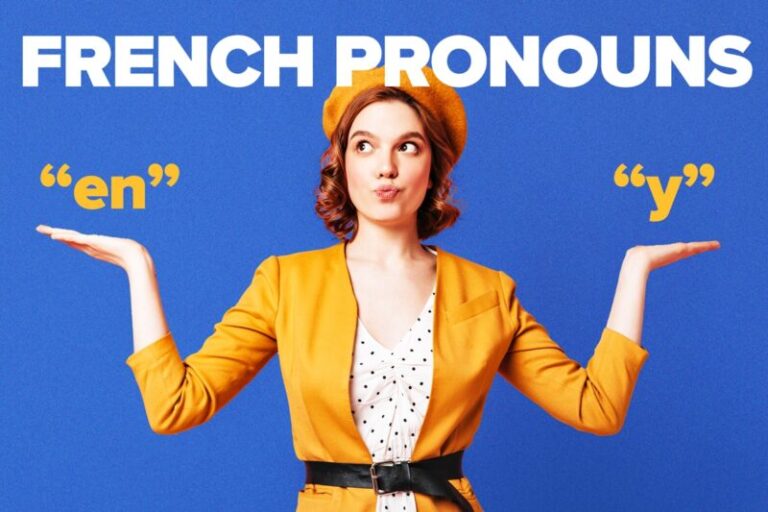The Many Meanings of C’est Bon

Sometimes, things that seem bland and mundane at first glance are actually fun, interesting and exciting. This is especially true when learning French: the French can take the most boring-sounding phrase and turn it around to express some pure joie de vivre.
And that’s just what they’ve done with the often-used phrase c’est bon. C’est bon literally means “That’s good,” but it can also mean so much more. If you master it, your conversations will flow better and you’ll sound more like a native speaker.
Download: This blog post is available as a convenient and portable PDF that you can take anywhere. Click here to get a copy. (Download)
Meanings of C’est Bon
1. “It’s Good”
Yes, this is the most literal translation of this common phrase. And it can be used to describe a vast array of good things in our lives.
So, when do we use c’est bon to mean “It’s good”?
Talking About Food
It’s no secret that the French love food. They love to eat it and they love to talk about it.
Though generic, c’est bon is an excellent catch-all phrase when a restaurant server inquires how your meal is, or your hostess wants to know if you’re enjoying your dessert.
For example:
“Tu aimes le dessert ?” … “Oui! C’est bon !” — “Do you like the dessert?” … “Yes! It’s good!”
Or:
Ce poulet, c’est bon ! — This chicken is good!
J’aime le gâteau. C’est bon. — I like the cake. It’s good.
One caveat: you might want to enrich your vocabulary with other ways to talk about food, such as with the FluentU program. Just saying “it’s good” is sometimes too vague and generic.
Talking About Sensory Experiences
Some things just look good, sound good, feel good.
C’est bon is the perfect phrase to convey that.
Cet odeur, c’est bon ! — That smell is good!
C’est bon, cette chanson ? — Is this song good?
J’adore le soleil; c’est bon. — I love the sunshine; it’s good.
In this context, the phrase c’est bon is also used to describe the good feeling of physical contact between lovers, aptly described in this famous song by Dean Martin.
It’s important to hear this phrase used in different contexts so that you really get a grasp on it. Watching authentic French videos, like the ones on FluentU, can help you with this.
FluentU takes authentic videos—like music videos, movie trailers, news and inspiring talks—and turns them into personalized language learning lessons.
You can try FluentU for free for 2 weeks. Check out the website or download the iOS app or Android app.
P.S. Click here to take advantage of our current sale! (Expires at the end of this month.)
2. “That Works” / “That’s Good for Me”
C’est bon is a useful expression for making or confirming plans.
Trying to firm up plans for dinner with friends this weekend?
Simply use c’est bon to ask about the best day or time, or to say what works for you.
Je suis libre ce vendredi soir. C’est bon pour toi ? — I’m free this Friday evening. Is that good for you?
Le dîner à six heures, c’est bon pour moi. — Dinner at six o’clock is good for me.
Partons-nous à neuf heures; c’est bon. — Let’s leave at nine o’clock; that’s good.
3. “It’s Good To…”
The phrase C’est bon de can be used with a verb to express that it’s good to do a certain thing.
For example:
C’est bon de manger les légumes. — It’s good to eat vegetables.
C’est bon de penser avant de parler. — It’s good to think before speaking.
4. “That’s Enough” / “That’s Okay”
This is a similar meaning to “that’s good,” but a different usage.
You can use c’est bon to say that you’re all set, that you don’t need anything else.
Pas de dessert pour moi. C’est bon. — No dessert for me. I’m okay.
Non merci, je ne veux pas de vin. C’est bon. — No, thank you, I don’t want any wine. I’ve had enough.
You can also use it to express frustration when you’ve had enough of a particular situation or problem.
Cesse de se plaindre; c’est bon. — Stop complaining. That’s enough.
Pourquoi est-ce qu’il pleut encore ? C’est bon. — Why is it still raining? Enough already!
Other Useful Phrases and Expressions with C’est Bon
There are many useful expressions that use the phrase c’est bon.
Here are a few:
C’est si bon. — That’s so good. (Check out this good old French song by Eartha Kitt for some great examples of how this phrase is used.)
C’est bon que… — It’s good that…
Ce n’est pas bon. — It’s not good.
C’est bon pour… — It’s good for…
C’est bon pour moi. — That’s good for me.
C’est bon à savoir. — That’s good to know.
C’est trop bon. — That’s too good.
For example:
C’est bon que tu me rendes visite. — It’s good that you visit me.
L’exercice, c’est bon pour le santé. — Exercise is good for your health.
For a fun example of the correct use of one of these expressions, check out this song by Compagnie Creole, “C’est Bon Pour le Moral” (“It’s Good for Morale”).
Grammatical Concerns and Usage Notes
When using the phrase c’est bon in conversation, there are a few grammatical concerns to keep in mind.
If you’re using this phrase with a noun (for example, “a good friend,” “a good teacher” or “a good pizza”), you use the masculine form of the noun.
C’est un bon pizza. — That’s a good pizza.
C’est un bon prof. — That’s a good teacher.
C’est un bon ami. — She/he is a good friend.
This is a pretty big exception to the French rule that adjectives always have to take on the same gender as the nouns they describe. It just goes to show you that in language, there are always exceptions to every rule.
Another rule to keep in mind when using c’est bon with a verb: be diligent about choosing the correct verb form for that construction.
For example, any verb used with the phrase c’est bon que needs to be in the subjunctive mood.
C’est bon que nous apprenions le français. — It’s good that we learn French.
C’est bon que tu sois heureux. — It’s good that you’re happy.
C’est bon qu’elle ait un chat. — It’s good that she has a cat.
However, any verbs used with the expression c’est bon de need to be in the infinitive form.
C’est bon d’apprendre le français. — It’s good to learn French.
C’est bon d’être heureux. — It’s good to be happy.
C’est Bon Vs. C’est Bien: What’s the Difference?
At first glance, it seems that these two expressions should be interchangeable.
But in reality, despite the surface similarity, they’re not the same.
The simplest way to tell the difference between them is to remember that bon typically describes a noun (like ice cream, an actor or the weekend) while bien is used to describe verbs (like doing, being or dancing).
This is why you say la glace est bonne (the ice cream is good), as opposed to je vais bien (I’m doing well).
It’s also the reason you use bien (instead of bon) to talk about how you’re feeling.
Je ne me sens pas bien. — I don’t feel well.
This is similar to the difference between “good” and “well” in English. Often, you’ll hear people say, “I feel good” or “I don’t feel good,” but actually, this is incorrect. The grammatically correct phrase is “I don’t feel well.”
If this is still confusing, keep in mind that c’est bon almost always describes something tangible and concrete, while c’est bien describes experiences or general ideas.
Examples:
“Est-ce qu’elle est une bonne chanteuse ?” … “Oui, c’est bon.” — “Is she a good singer?” … “Yes, she’s good.”
“Est-ce qu’elle chante bien ?” … “C’est bien.” — “Does she sing well?” … “She’s good.”
“Tu aimes la soupe ?” … “Oui, c’est bon.” — “Do you like soup?” … “Yes, it’s good.”
“Vous aimez voyager en France ?” … “Oui, c’est bien.” — “Do you like travelling in France?” … “Yes, it’s good.”
For a more detailed explanation of the difference between bon and bien, take a look at this helpful video lesson.
The Difference Between C’est Bon and Il/Elle est Bon
C’est bon and il est bon appear to have exactly the same meaning.
So when should you use c’est bon and when should you use il est bon instead?
C’est is more often used for generalities or abstractions. However, il est (and its feminine form, elle est) refers to something specific.
La litterature, c’est bon. — Literature (in general) is good.
Ce livre, il est bon. — This book (specifically) is good.
L’amour, c’est bon. — Love is good.
Mon mari, il est bon. — My husband is good.
With these points in mind, you’re well on your way to mastering this phrase, and being able to talk about all the things in life that are wonderful and pleasurable.
And that’s really good!
Download: This blog post is available as a convenient and portable PDF that you can take anywhere. Click here to get a copy. (Download)
And One More Thing...
If you like learning French at your own pace and from the comfort of your device, I have to tell you about FluentU.
FluentU makes it easier (and way more fun) to learn French by making real content like movies and series accessible to learners. You can check out FluentU's curated video library, or bring our learning tools directly to Netflix or YouTube with the FluentU Chrome extension.
One of the features I find most helpful is the interactive captions—you can tap on any word to see its meaning, an image, pronunciation, and other examples from different contexts. It’s a great way to pick up French vocab without having to pause and look things up separately.
FluentU also helps reinforce what you’ve learned with personalized quizzes. You can swipe through extra examples and complete engaging exercises that adapt to your progress. You'll get extra practice with the words you find more challenging and even be reminded you when it’s time to review!
You can use FluentU on your computer, tablet, or phone with our app for Apple or Android devices. Click here to take advantage of our current sale! (Expires at the end of this month.)











